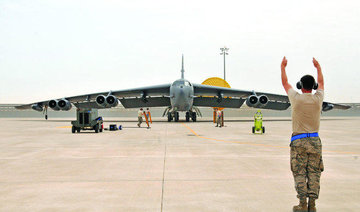MANAMA: Bahrain’s King Hamad on Sunday received Qatari opposition figure Sheikh Sultan bin Suhaim Al-Thani and his delegation at Al-Rawdah Palace in Manama.
Sheikh Sultan tweeted that it was an “honor” to meet with the king. During their meeting, they reviewed bilateral relations.
A lunch banquet was held in honor of the sheikh and his delegation. “I thank the people of Bahrain and their government for their generosity and warm hospitality,” Sheikh Sultan tweeted.
As president of the Qatar Forum, he publicly called for an end to the dispute between his country and the Anti-Terror Quartet (ATQ), comprising Saudi Arabia, the UAE, Bahrain and Egypt.
Bahraini king receives Qatari opposition figure
Bahraini king receives Qatari opposition figure

France condemns deadly 'Israeli fire' near Gaza aid point

- The territory of more than two million people is suffering from famine-like conditions after Israel blocked all supplies from early March to the end of May and continues to impose restrictions, according to human rights groups
- The United Nations and major aid groups have refused to cooperate with the foundation over concerns it was designed to cater to Israeli military objectives
PARIS: France on Tuesday condemned what it called deadly “Israeli fire” against civilians in Gaza, after rescuers accused Israeli forces of killing 21 people as they waited for aid.
“France condemns the Israeli fire that last night hit civilians gathered around an aid distribution center in Gaza, causing several dozen dead and wounded,” the foreign ministry said, appearing to refer to an incident early on Tuesday in central Gaza that the Israeli military says was “under review.”
In a second such incident, a civil defense spokesman also reported Israeli fire killing a further 25 people seeking rations in south Gaza later in the day.
According to figures issued on Tuesday by the health ministry in the Gaza Strip, a territory run by the Hamas Islamist group, at least 516 people have been killed and nearly 3,800 wounded by Israeli fire while seeking rations since late May.
The territory of more than two million people is suffering from famine-like conditions after Israel blocked all supplies from early March to the end of May and continues to impose restrictions, according to human rights groups.
The aid is being distributed by US- and Israeli-backed privately run aid group Gaza Humanitarian Foundation (GHF), which was brought into the Palestinian territory at the end of May to replace UN agencies.
The United Nations and major aid groups have refused to cooperate with the foundation over concerns it was designed to cater to Israeli military objectives.
“France reiterates its full support for United Nations agencies and their humanitarian partners, who have proven their integrity and ability to deliver aid in full respect of humanitarian principles,” the ministry said.
“Humanitarian aid must not be exploited for political or military purposes,” it added.
“France calls on the Israeli government to allow immediate, massive, and unhindered access to humanitarian aid in Gaza.”
Algeria prosecution seeks 10 years jail for writer Sansal on appeal

- The dual Algerian French writer, whose case has been at the heart of a diplomatic row between Paris and Algiers, was sentenced to five years imprisonment on March 27
- Sansal, 80, was arrested in November at the Algiers airport and has been detained since for undermining Algeria’s territorial integrity
ALGIERS: Algeria’s prosecutor general sought at an appeal hearing on Tuesday 10 years in prison for novelist Boualem Sansal, doubling his current sentence, an AFP journalist in the courtroom reported.
The dual Algerian French writer, whose case has been at the heart of a diplomatic row between Paris and Algiers, was sentenced to five years imprisonment on March 27.
A verdict is expected on July 1.
Sansal, 80, was arrested in November at the Algiers airport and has been detained since for undermining Algeria’s territorial integrity.
This came after he said in an interview with a far-right French media outlet that France unfairly ceded Moroccan territory to Algeria during the 1830-1962 colonial era.
The statement was viewed by Algeria as an affront to its national sovereignty and echoed a long-standing Moroccan claim.
On Tuesday, Sansal appeared before the judge without legal representation after authorities said he wished to defend himself.
“The Algerian Constitution guarantees freedom of expression and conscience,” he told the court during the roughly 20-minute hearing, seemingly in good health. “This makes no sense.”
Defending the remarks he made to French far-right media on Algeria’s borders, he said: “Fortunately, after independence in 1962, the African Union declared that inherited colonial borders are inviolable.”
Also questioned on some of his books, Sansal answered: “We are holding a trial over literature? Where are we headed?“
According to his relatives, Sansal has been undergoing treatment for prostate cancer, and many feared his health would deteriorate in prison.
French President Emmanuel Macron has urged his Algerian counterpart Abdelmadjid Tebboune to show “mercy and humanity” toward Sansal.
But Algiers has insisted that the writer has been afforded due process.
His conviction and sentence further frayed ties between Paris and Algiers, already strained by migration issues and Macron’s recognition last year of Moroccan sovereignty over the disputed territory of Western Sahara, which is claimed by the Algeria-backed pro-independence Polisario Front.
Charges against the writer include “undermining national unity,” “insulting state institutions,” “harming the national economy,” and “possessing media and publications threatening the country’s security and stability.”
UAE’s president welcomes Israel-Iran ceasefire

- In call with Iran’s President Masoud Pezeshkian, Sheikh Mohamed bin Zayed Al-Nahyan says he hopes agreement will enhance security, peace across Middle East
LONDON: Sheikh Mohamed bin Zayed Al-Nahyan, the president of the UAE, welcomed a ceasefire agreement between Iran and Israel during a phone call with his Iranian counterpart on Tuesday.
Sheikh Mohamed told President Masoud Pezeshkian he hoped the agreement would “serve as a foundation for enhancing stability, security and peace across the Middle East,” the Emirates News Agency reported.
Sheikh Mohamed added it was important to “ensure the success of the agreement in a way that benefits all the countries and peoples of the region.”
Pezeshkian gave thanks for the UAE’s position during Israel’s recent airstrikes against Iran.
The ceasefire agreement brokered by US President Donald Trump came into force on Monday, a day after Iran attacked a US military base in Qatar in retaliation for the American bombing of its nuclear sites.
The UAE on Monday “condemned in the strongest terms” the Iranian attack on the Al-Udeid Air Base, which saw almost all of the missiles intercepted.
Rubio thanks Turkmenistan for letting through Americans from Iran

- Turkmenistan, one of the world’s most closed and authoritarian countries, initially balked at allowing Americans to cross
- Rubio, in his call with FM Rashid Meredov, expressed gratitude for Turkmenistan’s cooperation
WASHINGTON: US Secretary of State Marco Rubio on Tuesday thanked Turkmenistan and promised cooperation with the authoritarian state after it let US citizens cross through as they fled Iran following Israeli strikes.
Turkmenistan, one of the world’s most closed and authoritarian countries, initially balked at allowing Americans to cross but agreed over the weekend following appeals from Washington, officials said.
Rubio, in his call with Foreign Minister Rashid Meredov, “expressed gratitude for Turkmenistan’s cooperation,” State Department spokeswoman Tammy Bruce said.
Rubio said he “looks forward to further partnership with Turkmenistan, including expanding economic and commercial ties,” she said.
Washington has organized evacuation flights for its citizens in Israel, but has limited capacity in Iran due to the lack of diplomatic relations.
Most US citizens in Iran are dual nationals and hundreds have left since Israel launched its military campaign on June 13, another State Department official said.
Around 200 Americans had voiced an interest in going through Turkmenistan, which shares a 1,148-kilometer (713-mile) border with Iran, although so far only “tens” have proceeded through that route, the official said.
“We’re communicating to all of the US citizens... in Iran looking to go to Turkmenistan that that border is open,” the official said on customary condition of anonymity.
With flights unavailable, the vast majority have gone through Azerbaijan, with some also going through Armenia and Turkiye, the official said.
President Donald Trump, who has prioritized cracking down on immigration, earlier this month banned virtually all Iranian citizens and partially restricted nationals of Turkmenistan from entering the United States.
The visa restrictions continue to apply to Iranian nationals who leave even if they are family members of US citizens, the State Department official said.
Trump on Monday announced a ceasefire between Israel and Iran but voiced frustration at implementation.
Israel lifts domestic restrictions linked to Iran war

- Israel’s airport authority also announced that all flights to and from the country would resume
- The country has been under tight restrictions since the start of the war, with schools closed and non-essential businesses shut
JERUSALEM: Israel’s military said Tuesday it was lifting restrictions on public gatherings, workplaces and schools it imposed during its 12-day war with Iran after a ceasefire took effect.
“All areas of the country will shift to full activity” from 8:00 p.m. (1700 GMT) on Tuesday on the orders of Defense Minister Israel Katz, the military said in a statement.
The guidelines will be effective until Thursday evening when they will be reviewed.
Israel’s airport authority also announced that all flights to and from the country would resume.
According to the transport ministry, between 100,000 and 150,000 Israelis were stranded abroad when Israel closed its airspace after launching a massive bombing campaign against Iran on June 13.
Tens of thousands of them have since been repatriated by air or sea.
The country has been under tight restrictions since the start of the war, with schools closed and non-essential businesses shut.
Israel and Iran both said Tuesday they would abide by a ceasefire deal first announced by US President Donald Trump.
Israel, in announcing it had agreed to Trump’s plan, said it had achieved all its military objectives.
Iran initially stopped short of officially accepting the proposal, but President Masoud Pezeshkian later said that if “the Zionist regime does not violate the ceasefire, Iran will not violate it either.”
Israel hit Iranian military and nuclear facilities as well as key commanders and scientists, prompting waves of retaliatory Iranian missile fire at Israel.
The full extent of the damage in Israel is still not known due to military censorship rules, but at least 50 impacts have been acknowledged nationwide and the official death toll stands at 28.
At least four people died in the southern city of Beersheba on Tuesday in a missile attack launched by Iran shortly before the ceasefire entered force, the emergency services said.






















